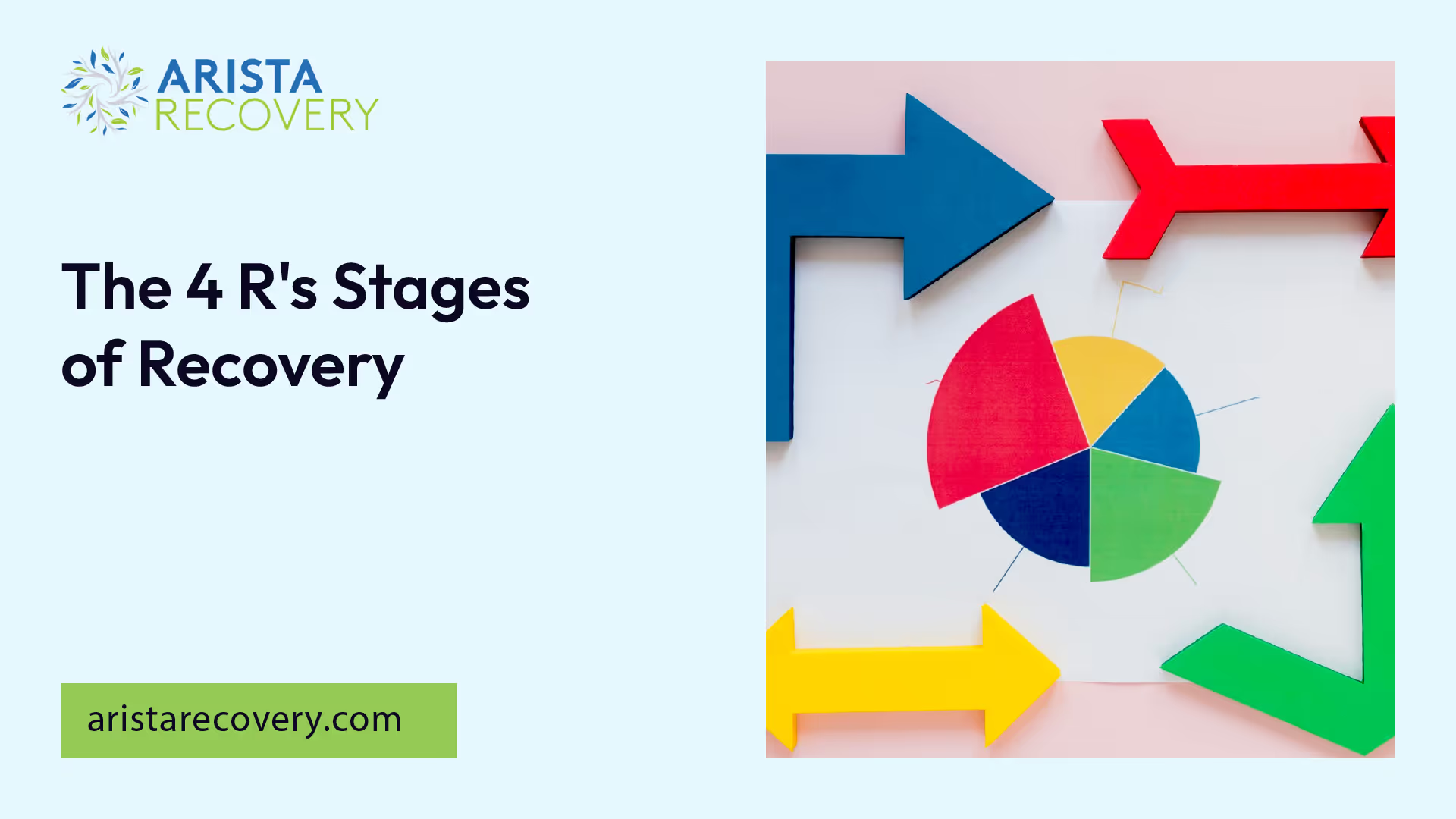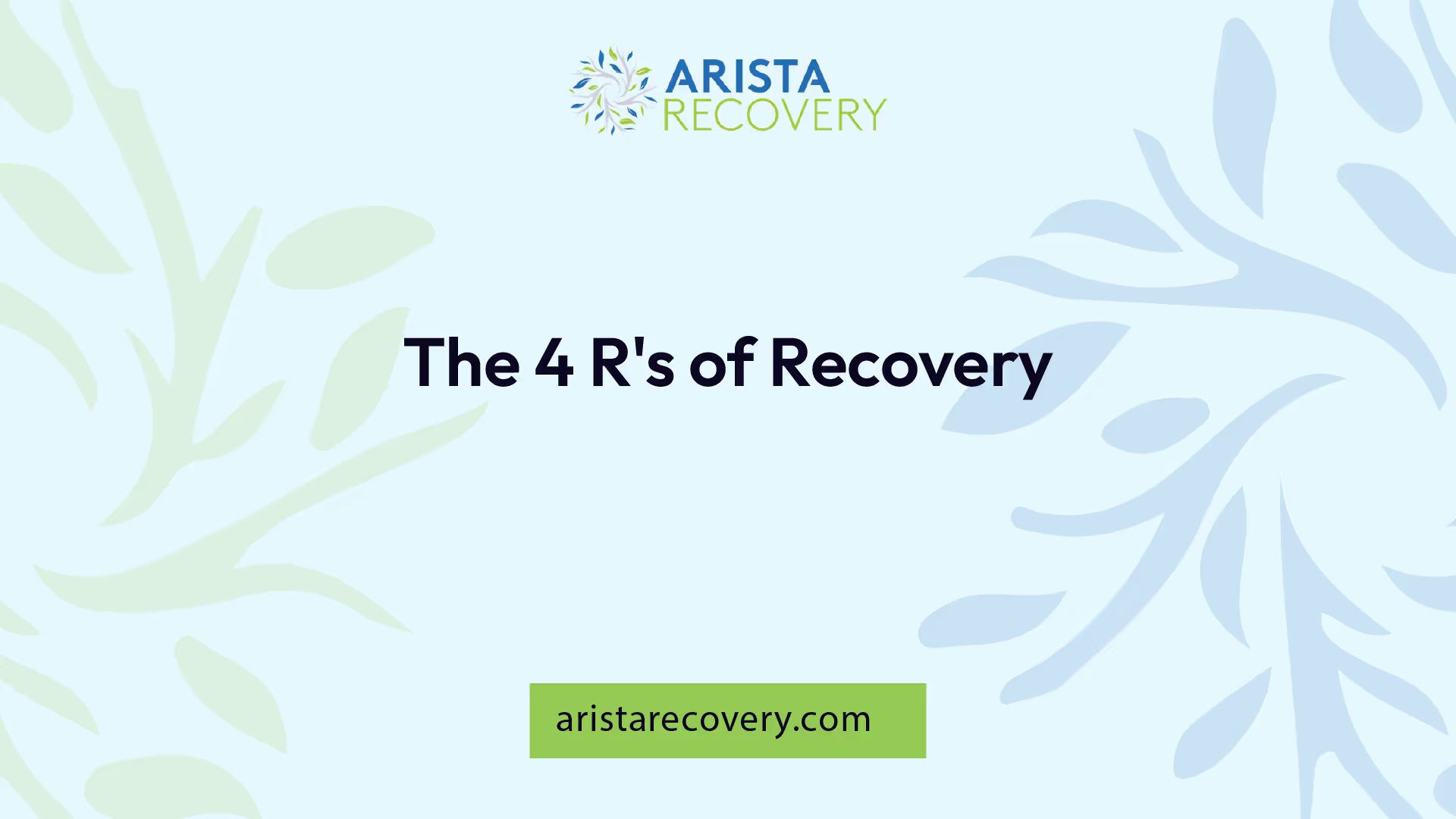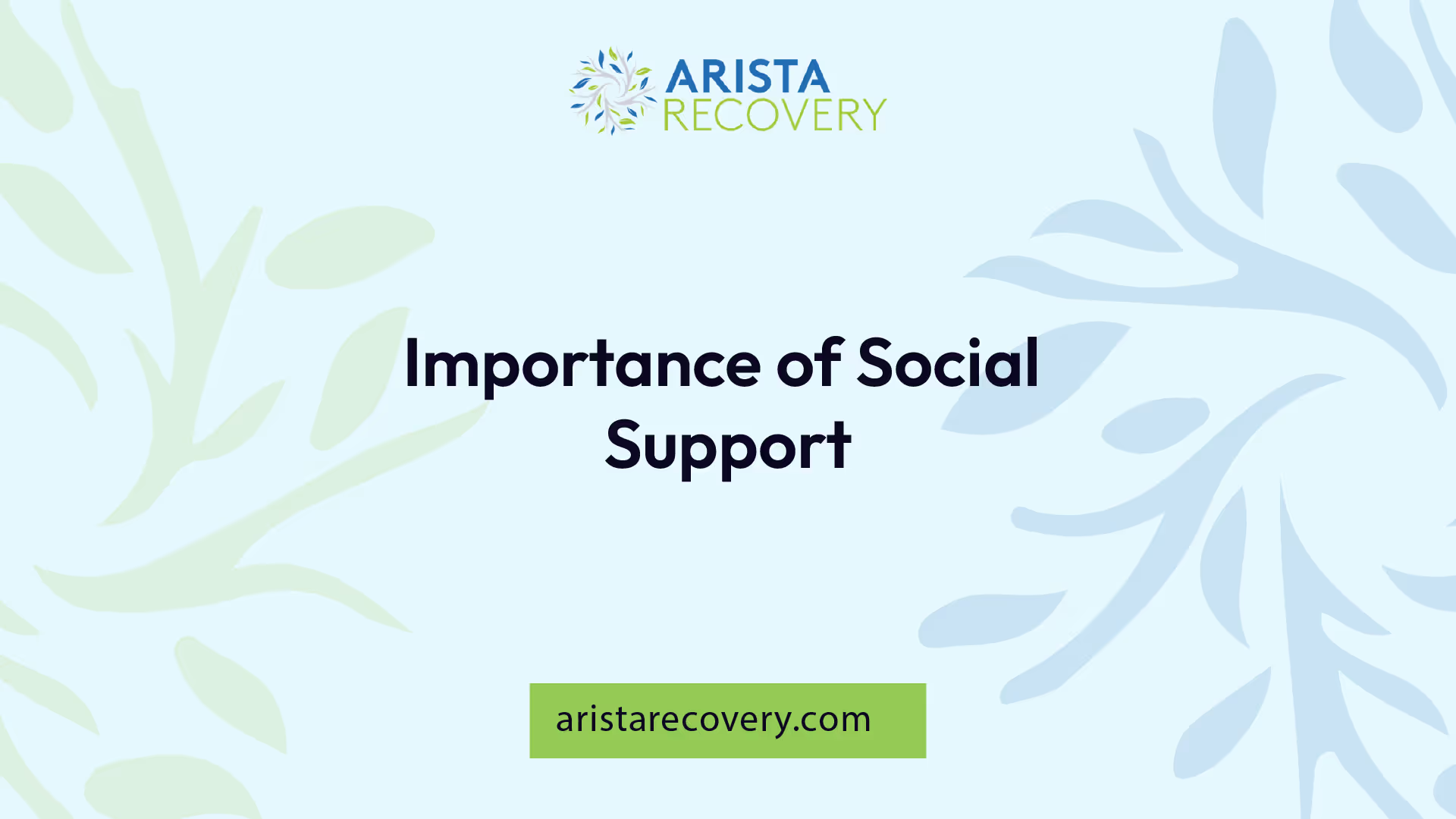The 4 R's Stages of Recovery

Understanding Recovery Stages
Understanding the different stages of recovery is critical for individuals suffering from addiction. Two widely recognized models provide insight into these stages: The Transtheoretical Model and The Betty Ford Consensus Panel Definition.

The Transtheoretical Model
The Transtheoretical Model, created by Prochaska, DiClemente, and Norcross in 1983, outlines the different stages individuals with substance use disorder go through. These stages include the "pre-contemplative" stage, the "contemplative" stage, the "preparation" stage, the "action" stage, and the "maintenance" stage. Each stage represents a different phase in the recovery process [1].
These stages are not necessarily linear, and individuals do not stay in them for a set amount of time. Some people progress quickly through the stages, while others may move back and forth between stages.
The Betty Ford Consensus Panel Definition
The Betty Ford Consensus Panel on Recovery defines recovery as "a voluntary maintained lifestyle characterized by sobriety, personal health, and citizenship." They further elaborate on the three aspects of recovery: functional recovery, personal recovery, and social recovery [3].
These models provide a comprehensive overview of the stages of recovery, but it's important to note that recovery is a personal journey that varies from person to person. For further understanding of recovery, check out our articles on spiritual recovery and emotional recovery.
The 4 R's of Recovery
Understanding the stages of recovery is crucial in the journey to overcome addiction. Many models outline these stages, but an intuitive way to understand them is through the 4 R's of recovery: Recognizing the problem, Reaching out for help, Rebuilding a new life, and Remaining in sobriety.

Recognizing the Problem
The first stage in the recovery process entails recognizing that there is a problem. This stage aligns with the precontemplation and contemplation stages of the transtheoretical model of addiction recovery. During this phase, individuals come to terms with the fact that they have a substance use disorder, and they begin to contemplate the need for change. It is essential to note that only 11% of individuals meeting substance use disorder criteria receive specialty addiction treatment each year, highlighting the need for interventions during this stage.
Reaching Out for Help
The second stage, reaching out for help, is characterized by preparation and action. Here, individuals prepare for addiction treatment by seeking professional help and making necessary lifestyle changes. They may participate in counseling, self-care activities, and self-understanding efforts to help them navigate the recovery process. It's important to remember that recovery is not a linear process, and individuals may progress at their own pace [2].
Rebuilding a New Life
In the third stage of recovery, individuals work on rebuilding a new life. This stage involves significant lifestyle changes and prolonged periods of abstinence. It also represents the action stage of addiction recovery, where individuals actively participate in their healing process. They may engage in recovery strategies such as attending therapy sessions, joining support groups, and incorporating healthy habits into their daily routine. This stage of recovery is transformative, both physically and emotionally, leading to a healthier and more stable lifestyle.
Remaining in Sobriety
The final stage, remaining in sobriety, correlates with the maintenance stage of addiction recovery. Here, individuals work diligently to prevent relapse, maintain the lifestyle changes they've adopted, and continue their sobriety. This stage can last from six months to five years, depending on the severity of the addiction and the individual's personal circumstances.
Aftercare is a crucial component in this stage. It helps individuals stay on track, implement what they learned during rehabilitation, and maintain sobriety. It is recommended to stay in some form of aftercare for at least one or two years after completing a rehab program to prevent relapse.
The 4 R's of Recovery provide a simplified roadmap to understanding the stages of recovery. This model emphasizes the importance of recognizing the problem, reaching out for help, rebuilding a new life, and remaining in sobriety. The journey through these stages is not a linear one; instead, it involves moving back and forth between stages and experiencing individual progress at varying paces. The key is to stay committed to the journey, continually striving for progress, and seeking help when needed. For more resources on emotional and spiritual recovery, visit our dedicated sections.
Importance of Social Support
In the journey through the stages of recovery, social support plays a critical role. This support can come in various forms, including from social support groups and family and friends.

Role of Social Support Groups
Social support groups, such as Alcoholics Anonymous (AA) or Narcotics Anonymous (NA), are crucial sources of social support that can significantly enhance an individual's chances of successful recovery. These mutual aid groups provide abstinence-specific support, shared experiences, and a sense of belonging. It's been shown that active involvement in such groups is more important than just attendance and can increase treatment engagement and improve substance use disorder outcomes.
Furthermore, research from Pinnacle Treatment Centers suggests that people who attend social support meetings once a week or more tend to have greater success in recovery compared to those who attend infrequently or do not attend support group meetings at all. For more on the role of such groups in the recovery process, visit our article.
Impact of Family and Friends
Family and friends also play a pivotal role in the stages of recovery. Supportive family relationships that encourage reduced substance use are linked to decreased risk of recurrence of substance use following treatment. Family-based approaches are integral to successful intervention and recovery for adolescents with substance use disorders.
Beyond family, close friends and peer groups influence substance use initiation, recovery, and recurrence of substance use. Networks supportive of abstinence yield better treatment outcomes, and maintaining relationships with individuals engaged in negative behaviors increases the risk of return to substance use.
Whether it's through social support groups, family, or friends, having a strong network of support is a vital aspect of long-term recovery. Such support not only provides motivation and encouragement but also helps individuals to cope with challenges and setbacks they might encounter along their journey. To learn more about the importance of emotional support during recovery, check out our article on emotional recovery.
Overcoming Common Challenges
Navigating through the stages of recovery is not a straightforward journey. It's filled with numerous hurdles and challenges that test an individual's resolve and resilience. Here, we examine some of these common challenges, along with tips on how to overcome them.
Managing Mental Health Symptoms
One of the biggest obstacles individuals often encounter during the recovery process is managing mental health symptoms. This is especially true for those with co-occurring disorders or comorbidities. These individuals are at a higher risk of addiction, and worsening mental health symptoms can increase the urge to relapse [5].
Symptoms of withdrawal, such as sleeplessness, mood swings, and digestive problems, can be challenging to manage without professional care. Trained addiction experts can help patients manage their symptoms in a safe environment, reducing the risk of relapse.
To help manage mental health symptoms, individuals are encouraged to reach out to counselors and therapists who can provide the needed support and guidance throughout the recovery process.
Dealing with Social Stigma
Another significant obstacle comes in the form of social stigma surrounding addiction. It can lead individuals to feel ashamed, embarrassed, or like outcasts. The perceived stigma may cause individuals to lose friends or feel like failures for seeking treatment.
It's crucial to remind individuals that seeking help is a sign of strength and to focus on the positive aspects of recovery rather than dwelling on the negative impacts of substance abuse. Encouraging a sense of community and support can be instrumental in alleviating the impact of social stigma.
Financial Struggles in Recovery
Financial struggles are common during addiction recovery, as individuals may face significant financial troubles due to the costs of substances, neglecting responsibilities, and losing sources of income like jobs. This financial turmoil can make it challenging for individuals to prioritize getting the help they need to overcome addiction [5].
Addressing financial issues as part of the recovery strategies can help alleviate some of the added stress and facilitate a more focused recovery journey.
Battling Self-Doubt
Self-doubt is a psychological battle that many people face during addiction recovery. Negative thoughts and doubts about overcoming challenges can arise, hindering progress. Encouraging individuals to recognize their progress, no matter how small, and maintaining a positive mindset throughout recovery can help combat self-doubt and promote a healthier mental state [5].
Through understanding and addressing these common challenges, individuals can better navigate the path of recovery, fostering resilience and determination that will see them through this journey. An integral part of recovery also involves emotional recovery, which focuses on the emotional and psychological aspects of overcoming addiction.
Trauma Recovery Phases
The journey through trauma recovery is often marked by distinct stages. As outlined by Dr. Pierre Janet and later popularized by Dr. Judith Herman, these phases offer a roadmap for individuals working to regain control over their lives after experiencing trauma [6]. It's important to remember that the stages of recovery are not linear and can vary based on individual circumstances.
Safety and Stabilization
The first stage of trauma recovery involves Safety and Stabilization. Individuals affected by trauma often feel unsafe in their bodies and relationships with others. Regaining a sense of safety can take a varied amount of time, ranging from days to weeks for acutely traumatized individuals or months to years for those who have experienced ongoing or chronic abuse. The focus of this phase is on stabilizing different areas of life to move towards recovery. This includes developing a sense of safety both physically and emotionally, a crucial step in the recovery process [6].
Remembrance and Mourning
The second stage of trauma recovery, Remembrance and Mourning, involves processing the trauma, putting words and emotions to it, and making meaning of it. This phase is usually undertaken with the guidance of a counselor or therapist, and while safety and stability continue to be a priority, the focus shifts towards understanding and expressing feelings about the trauma. Pacing and timing are key during this phase to prevent emotional overwhelm. It's a time for emotional recovery, allowing the individual to confront and integrate their traumatic experiences into their narrative.
Reconnection and Integration
The third stage of trauma recovery, Reconnection and Integration, marks a time when individuals create a new sense of self and future. This phase focuses on redefining oneself in the context of meaningful relationships and integrating the trauma into their life story without it being the only defining element. It's a period of spiritual recovery as individuals recognize the impact of victimization and take steps towards empowerment and self-determined living. The trauma becomes a part of their history, but it no longer holds the power to control their life.
The phases of trauma recovery highlight that healing is a process. It's important to be gentle, patient, and compassionate with oneself throughout each stage, as recovery is not defined by the complete absence of thoughts or feelings about the traumatic experience, but by being able to live with it in a way that it does not control one's life. The journey may seem long, but with the right strategies and support, it is possible to navigate through the stages of recovery and come out stronger on the other side. For more information on how to navigate this journey, check out our article on recovery strategies.
Athletes in Recovery
The journey through recovery can be a challenging and transformative experience, especially for athletes. Understanding the unique obstacles that athletes face during recovery can provide vital insights that enhance the recovery process.
Barriers to Progress
Athletes experience a variety of barriers to progress during recovery. Fear is the most commonly reported barrier, especially during the return to sport stage. Other emotional barriers such as frustration and anxiety are evident throughout all recovery stages.
Athletes also report multiple barriers based on psychological factors, and social and contextual factors. These barriers can often lead to setbacks and delays in the recovery process. It's crucial for athletes to recognize these barriers and develop recovery strategies to overcome them effectively.
Importance of Independence
Injured athletes value playing an active role in their recovery. They want strategies to understand their injury, manage emotions, and deal with athletic identity loss. Active coping strategies are important for managing recovery setbacks and problem-based coping tactics during return to sport [7].
Moreover, athletes desire to develop or preserve their independence and have control over their rehabilitation. Developing greater independence by promoting self-motivation, confidence, and autonomy around decisions positively influences rehabilitation or return to sport outcomes [7].
Social Support in Recovery
Social support plays a crucial role in the recovery journey of athletes. Athletes recovering from knee injuries reported a desire for support from various sources, which change throughout the stages of recovery. Family, friends, teammates, coaches, physical therapists, and other medical staff are all valued sources of support at different stages of recovery.
Overall, the journey through recovery is unique for each individual, especially athletes. By understanding the barriers to progress, the importance of independence, and the need for social support, athletes can navigate the stages of recovery effectively. Whether it's spiritual recovery or emotional recovery, understanding and addressing these factors can be instrumental in achieving a successful recovery journey.
References
[1]: https://www.recoveryanswers.org/resource/stages-of-recovery/
[2]: https://www.racnj.com/the-five-stages-of-addiction-recovery/
[3]: https://pinnacletreatment.com/blog/the-importance-of-social-support-in-recovery/
[4]: https://www.ncbi.nlm.nih.gov/pmc/articles/PMC6803054/
[5]: https://mayflowerrecovery.com/5-common-challenges-faced-in-addiction-recovery-and-how-to-overcome-them/
[6]: https://trauma-informed.ca/recovery/phases-of-trauma-recovery/
You’re not alone in this.
When mental health challenges and addiction intersect, it can feel isolating. At Arista, we offer compassionate, evidence-based, and trauma-informed care to help you heal, grow, and move forward.
You’re not alone in this.
When mental health challenges and addiction intersect, it can feel isolating. At Arista, we offer compassionate, evidence-based, and trauma-informed care to help you heal, grow, and move forward.
Support that moves with you.
You’ve taken a brave first step. At Arista Recovery, we’re here to help you continue with best-in-class care designed for long-term healing and support.
.webp)






